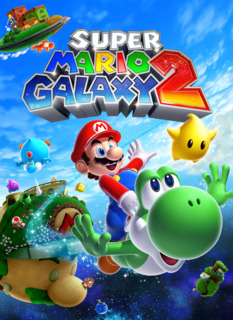A great sequel that improves upon the original creative basis set by its predecessor.
Super Mario Galaxy 2 is intended to be a sequel to the game, but the only "sequel-esque" inference is the overall continuation of not the plot, but the concept of finding and utilizing Power Stars. Power Stars play the same role in this sequel, in that they are used (all 120 of them) to power Starship Mario into traversing the universe to find -- you guessed it -- Princess Peach, who is once again captured by Bowser. Despite being thrown into a macrocosmic oblivion in Super Mario Galaxy, Bowser returns in an unscathed mechanical presentation with the same one-track mind of inexplicable kidnap. Bowser could at least come back as a half-cyborg or something. Luckily, after finding all 120 stars, you are able to go back to the planets you've completed to find a select number of green shooting stars cleverly hidden throughout the levels. Once these are found, a grand, challenging final level is available. Sort of like the star festival that what was found once all 240 stars were captured in Super Mario Galaxy, where, incidentally, this game begins.
It's not that capturing Peach for the _____ time is a bad thing, but an attempt to at least incorporate some kind of interrelation between games and characters would have been very much appreciated. Mario doesn't need to develop into an epic, but there is almost no background motivation in rescuing Peach and defeating Bowser, save for traversing new, unpredictable locales. Not incorporating any string of developmental progression in plot is ridiculous.
Super Mario Galaxy 2's faults do not end there, however, but the remainder of its problems falls victim to many sequels. Although Super Mario Galaxy 2 incorporates suits, beautiful galactic locations, a sweeping score, gravitational manipulation, and tight gameplay mechanics, it's all been done before -- but this time there is much less frustration to go around. Not to complain that these are bad things altogether, but the "Wow!" factor has exponentially dwindled. None of what Super Mario Galaxy 2 showcases is nearly as impressive as it was the first time around. At times, it will feel like you're playing Super Mario Galaxy 1.5, but again, it's difficult for a sequel to re-innovate many mechanics that were flawlessly executed previously. The thing is, is that those who will experience Super Mario Galaxy 2 may not have experienced the first Super Mario Galaxy, and it may very well be the first initial experience into the incredible universe that the game establishes. If this is the case for those gamers, then they are in for one of the biggest treats of their lives. For the rest of us who have played the first one, well, we'll be noticing more than a few similarities.
With all of this complaining, one would only figure if the game does anything right in its own merit. The answer is a most indefinite yes. Although this sequel suffers from unoriginality, everything else has been improved tremendously. Indeed, every gameplay-related concept from Super Mario Galaxy has been fully realized to even greater perfection: more varied planets, more suits, more exploration, and more overall fun. That's what truly makes this game shine in its own right. Also, implementing Yoshi makes way for many more ways of having fun in the many worlds the enthused gamer will explore.
If Super Mario Galaxy 2 had been released as Super Mario Galaxy in 2007, it would undoubtedly be the best 3-D Mario game ever developed, but the reason why the original Super Mario Galaxy trumps in my mind is because the introduction is unparalleled for a Mario game with such initial innovation. Despite all this, Super Mario Galaxy 2 does many things right, and it is not only a great game, but it's also a great Mario game, and it stands alongside Super Mario Galaxy as one the best Mario games ever released in its long, thriving history.

